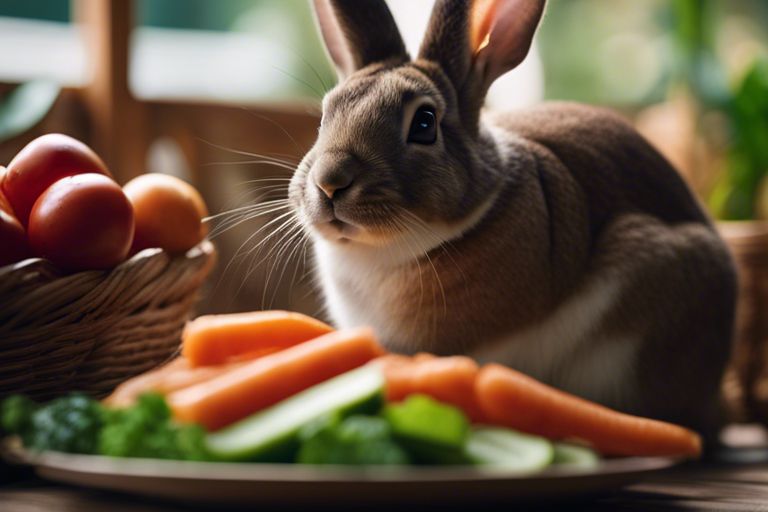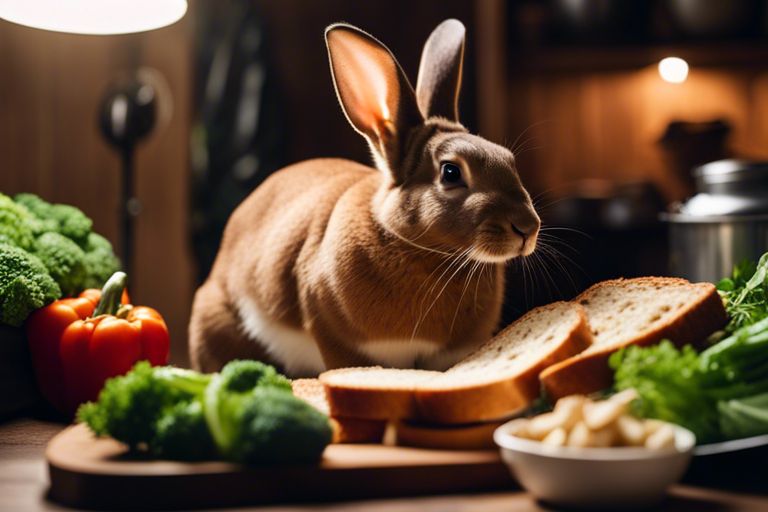Keen to discover if your Flemish Giant rabbit can nibble on some bread? These majestic creatures, known for their large size and gentle nature, have specific dietary needs that must be met to ensure their health and well-being. Let’s probe into whether bread is a suitable snack option for these beloved rabbits.
Key Takeaways:
- Flemish Giants can eat bread in moderation: It can be given as an occasional treat, but should not be a staple in their diet.
- Bread should be given in small quantities: Too much bread can lead to health issues like obesity and digestive problems in Flemish Giants.
- Opt for whole grain bread: Whole grain bread is a better option than white bread as it is more nutritious and contains fiber.
- Monitor for any negative reactions: Watch out for any signs of allergies or digestive issues after feeding bread to your Flemish Giant.
- Consult with a veterinarian: Before introducing bread or any new food to your Flemish Giant’s diet, it’s always best to consult with a vet to ensure it is safe and appropriate for them.

Understanding Rabbit Nutrition
There’s a lot to consider when it comes to the nutrition of your Flemish Giant rabbit. One of the best ways to understand what your rabbit needs in its diet is by looking at reputable sources like Our Diet. Ensuring a well-balanced diet is crucial for your rabbit’s health and well-being.
Importance of Fiber in a Rabbit’s Diet
Any responsible rabbit owner knows the importance of fiber in their pet’s diet. Fiber is crucial for maintaining a healthy digestive system in rabbits. It aids in preventing gastrointestinal stasis, which can be a severe and potentially life-threatening condition for rabbits. Ensure your rabbit has access to high-fiber hay and leafy greens daily to promote optimal digestion.
Common Dietary Risks and Myths
The understanding of a rabbit’s dietary needs is often clouded by common risks and myths. The key to a healthy rabbit diet is moderation and variety. The idea that rabbits can thrive solely on a diet of carrots and lettuce is a dangerous misconception. These foods are high in sugars and water content, which can lead to digestive issues if fed in excess.
It’s also important to note that not all fruits and vegetables are safe for rabbits. Some can cause digestive upset or even be toxic to rabbits. Always research new foods before introducing them into your rabbit’s diet.

Examining Bread as a Food Option
Nutritional Content of Bread
Examining the nutritional content of bread is crucial when considering it as a food option for Flemish Giant rabbits. Bread is primarily made from wheat flour, which provides carbohydrates for energy. However, it lacks crucial nutrients like protein, vitamins, and minerals that rabbits need for optimal health.
Potential Health Impacts of Bread on Rabbits
For Flemish Giant rabbits, consuming bread can have potential health impacts. While rabbits can eat small amounts of bread occasionally as a treat, it should not be a staple in their diet. Bread is high in carbohydrates and can lead to obesity in rabbits if consumed in excess. Additionally, the added sugars and salts in bread can disrupt the delicate balance of a rabbit’s digestive system.
Bread should be viewed as an occasional snack or treat for Flemish Giant rabbits rather than a regular food option. It is important to prioritize a diet that is high in fiber, such as hay and leafy greens, to meet their nutritional needs and promote overall health.
Safe Feeding Practices for Flemish Giant Rabbits
Healthy Alternatives to Bread
Keep in mind that bread should not be a regular part of your Flemish Giant rabbit’s diet. Instead, opt for healthier alternatives such as fresh greens like romaine lettuce, kale, and parsley. These fibrous and nutrient-rich options are better suited for your rabbit’s digestive system and overall health.
Guidelines for Treats and Supplements
Feeding your Flemish Giant rabbit treats and supplements should be done in moderation. Stick to small portions of rabbit-safe fruits like apples and berries as treats, ensuring they do not exceed 5% of your rabbit’s diet. Supplements should only be given if recommended by a vet to address specific health concerns.
When offering treats, always monitor your rabbit’s weight and adjust their diet accordingly to prevent obesity and other health issues. Ensure that any treats or supplements provided are safe for rabbits and do not contain harmful ingredients.
Flemish Giant Rabbits and Their Dietary Needs
Conclusion
Conclusively, Flemish Giant rabbits can eat bread in moderation as an occasional treat. However, it should not be a primary part of their diet due to the lack of crucial nutrients and the risk of obesity. It is important to prioritize hay, fresh vegetables, and high-quality pellets in their daily meals to ensure their optimal health and well-being. Always consult with a veterinarian before introducing any new food into your rabbit’s diet to prevent any potential health issues.
FAQ
Q: Can Flemish Giant Rabbits Eat Bread?
A: No, Flemish Giant rabbits should not be fed bread. Bread can cause digestive issues in rabbits as it is high in carbohydrates and low in fiber, which can lead to obesity and gastrointestinal problems.
Q: What should be the primary diet for Flemish Giant Rabbits?
A: The primary diet for Flemish Giant rabbits should consist of hay, fresh vegetables, and a small amount of pellets. Hay is crucial for their digestive health, while vegetables provide crucial nutrients. Pellets should only make up a small portion of their diet.
Q: Are there any safe treats for Flemish Giant Rabbits?
A: Yes, some safe treats for Flemish Giant rabbits include leafy greens like kale, herbs like cilantro, and fruits like strawberries in small quantities. Always introduce new foods gradually to ensure they do not cause any stomach upset.
